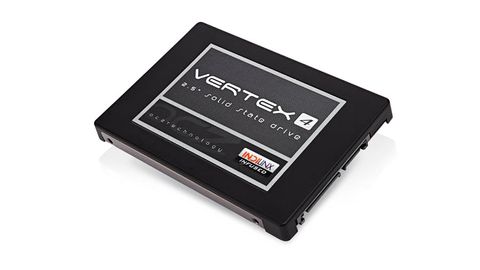TechRadar Verdict
Pros
- +
Excellent sequential data performance
- +
TRIM support in RAID
- +
Decent price
Cons
- -
Random 4K performance could be better
- -
Reliability concerns
- -
Firmware update introduced more bugs
Why you can trust TechRadar
The Lord giveth and the Lord taketh away. The divine benevolence in question is the belated and very much awaited arrival of TRIM support when operating SSDs in RAID arrays. It's been a serious bone of contention for solid-state RAID because it's just not advisable to run SSDs without TRIM enabled.
The TRIM command ensures that deleted data is just that. Deleted. If it's not the result can be degraded performance over time as commands to write data come up against memory cells that are marked for deletion but not empty. When that happens, the data has to be deleted before being written. That takes time and time means lower performance.
Anyway, Intel has finally come up with a storage driver that does the TRIM thing when SSDs are obscured behind a RAID array. Cue much rejoicing.
However, the new driver only applies to the latest 7 Series motherboard chipsets. So if, for example, you recently bought a 6 Series board, TRIMed-up RAID has been snatched away just when you thought it was yours.
We doubt there's any hardware limitation here. It could simply be Intel spurning its existing customers, as is occasionally its wont.
Now, none of this has anything directly to do with OCZ and its Vertex 4 drive in 512GB. Except we just happen to have a pair of them on hand. And, well, it's rude not to.
Unfortunately, it's here that the Almighty steps in again, because the Vertex 4 512GB in speedy RAID0 promises much, but doesn't quite deliver. Some of our benchmark results are staggering. You're looking at 1GB/s for peak reads and writes. It's the sort of massive performance we've fantasised about ever since the prospect of solid-state storage for PCs was mooted.
Benchmarks
Sequential drive performance (compressible)
ATTO: Megabytes per second: Bigger is better
OCZ VERTEX 4 512GB RAID0: 1063
OCZ VERTEX 4 256GB: 528
CRUCIAL M4 256GB: 446
INTEL SSD 520 240GB: 555
4K random writes performance
AS SSD: Megabytes per second: Bigger is better
OCZ VERTEX 4 512GB RAID0: 62
OCZ VERTEX 4 256GB: 70
CRUCIAL M4 256GB: 51
INTEL SSD 520 240GB: 50
Application performance
1GB unzip: Seconds: Lower is better
OCZ VERTEX 4 512GB RAID0: 25
OCZ VERTEX 4 256GB: 26
CRUCIAL M4 256GB: 27
INTEL SSD 520 240GB: 25
Elsewhere, however, things are less impressive. The results for 4K random writes are lower than we achieved for a single 256GB version of the Vertex 4 and performance in this area is arguably more critical for that 'feel' of rapid PC performance.
Making matters worse, attempting to update to the latest 1.5 firmware revision, with a view to seeing if that helped sort the ordinary 4K performance, resulted in system hangs. If that wasn't bad enough, one of the drives was throwing errors in the RAID BIOS.
The killer blow involved reports from our IT department involving failures of two Vertex 4 512GB drives. The bottom line, then, is that here in 2012, we're still waiting for SSDs to fully mature as a technology. Too many drives are still blighted by reliability and longevity concerns. And we're afraid the Vertex 4 in 512GB spec is no different.
With that in mind, we tend towards the conservative when it comes to picking SSDs. That means we can't recommend this drive. It's a shame because the raw performance looks great.
We're also fans of the work OCZ is doing in bringing the Everest 2 SSD controller chipset and firmware to market and thereby ramping up the competition with SandForce, Samsung and the rest. The Vertex 4 is promising, but OCZ really needs to tidy up its act.
Technology and cars. Increasingly the twain shall meet. Which is handy, because Jeremy (Twitter) is addicted to both. Long-time tech journalist, former editor of iCar magazine and incumbent car guru for T3 magazine, Jeremy reckons in-car technology is about to go thermonuclear. No, not exploding cars. That would be silly. And dangerous. But rather an explosive period of unprecedented innovation. Enjoy the ride.

